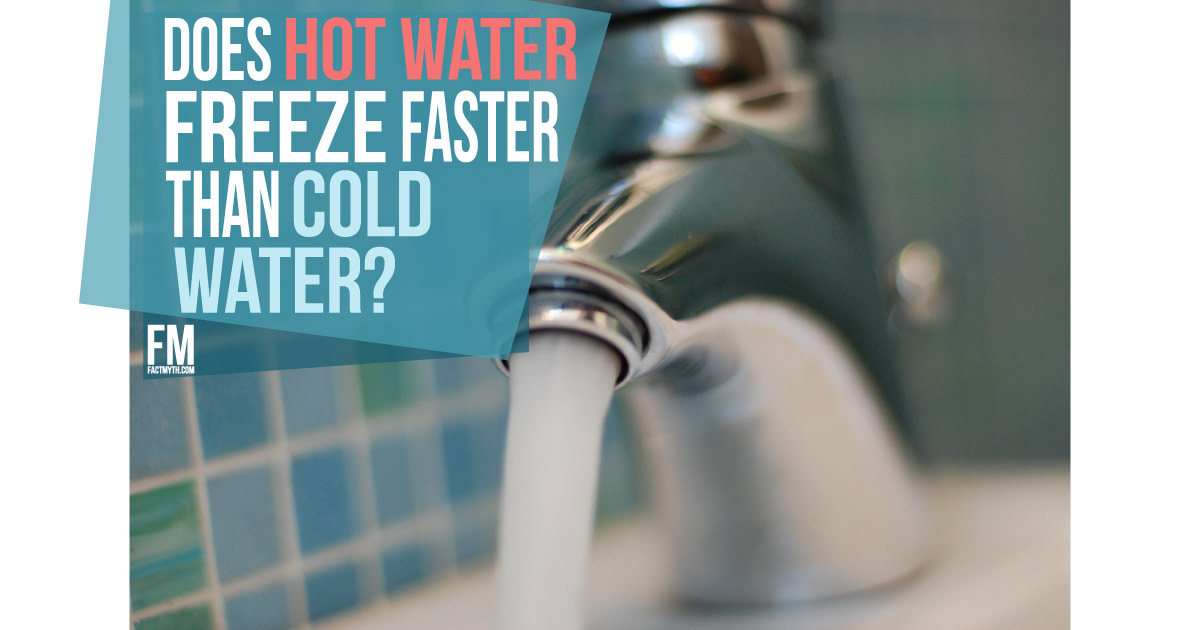Hot water can freeze faster than cold water, but not always. We don’t fully understand why, but hey, a 13 year old discovered the effect, maybe you’ll be the one to solve it.
Hot Water Can Freeze Faster than Cold Water fact

Can Hot Water Freeze Faster than Cold Water?
Hot water can freeze faster than cold water, but it does not always do so. This “Mpemba effect” may be related to “supercooling”, but that hasn’t been proven yet.
The Mpemba Effect (explained below) has been the focus of many different experiments. You would think it would be an easy experiment to perform and repeat, but no one can prove exactly why hot water freezes faster than cold water. When scientists first questioned this factoid, it seemed simple. Many scientists voiced their opinion about what exactly was going on when hot water froze, but all were proven wrong through trial and error.
TIP: Forget the idea that H20 (water) freezes at 32 degrees Fahrenheit, 0 degrees Celsius, or 273.15 Kelvin. Water does a wide range of things based on a wide range of factors, and other liquids heat and cool at wildly different temperatures as well. Learn more at Smithsonian.com.
The Mpemba Effect
The Mpemba effect is named after Erasto Mpemba. In 1963, the 13-year-old Erasto Mpemba noticed this phenomenon while making ice cream at school. Mpemba was told to wait for the boiling milk and sugar mix to cool down before putting it in the freezer. In a rush, Mpemba didn’t wait for his mix to cool down and stuck it straight in. Later checking on the ice cream, he was surprised when his batch froze faster than the other classmates ice cream. The teacher didn’t believe Mpemba and thought he just got the ice cream confused. Mpemba later proved he was telling the truth when one day he did the experiment at school, using just water and found the same results as the ice cream.[1][2]
The Full History of the Mpemba Effect
Although this anomaly was brought to modern day attention by Erasto Mpemba, it was first recorded by Aristotle in 4th Century BC, when he observed that “The fact that the water has previously been warmed contributes to it’s freezing quickly: for so it cools sooner. Hence many people, when they want to cool water quickly, begin by putting it in the sun” –Aristotle. Scientist’s in the 1400’s believed in Aristotle’s original observation and tried to take it an extra step by saying it affected how our bodies reacted when switching from summer to winter but again couldn’t prove it.
Years later, in the 13th Century Roger Bacon also noticed this effect and tried to prove it scientifically with several experiments but didn’t have any success with it. But still made sure to document in his philosophical book Novum Organum, “slightly tepid water freezes more easily than that which is utterly cold” –Roger Bacon
After Roger Bacon’s failed attempt at proving the great question, it was lost until 1963 where Erasto Mpemba took it over.
Supercooling and Freezing Water
Supercooling allows liquid to be below freezing point without it actually becoming a solid. Normal water that you’d get from the tap contains minerals that allow the water molecules to bind and freeze, which makes the ideal freezing point 0°C. When you have purified water or boiled water, most minerals are precipitated out. Without these extra minerals, the water molecules have trouble crystallizing, causing their freezing point to be a few degrees lower. This plays a big factor in our experiment. It is said that hot water will supercool to around -2°C before it starts becoming a solid, while cold water won’t start forming until -8°C. The results will vary depending on the amount of minerals remaining in the water.[3][4]
Learn about the theory that supercooling causes the Mpemba effect at “phys.org’s Mpemba effect: Why hot water can freeze faster than cold.”
Fact: Animals that live in below freezing temperatures, have natural supercooling abilities that allow their internal fluids to stay liquid in survival situations. [Freeze Tolerant Animals]
Other Factors that Cause the Mpemba Effect
These are the main suggestions that scientists believe to be key factors in enabling the Mpemba Effect.
Evaporation
As the warmer water cools, it loses mass through evaporation which causes it to freeze faster but produces less ice.
Convection Currents
When hot water enters the freezer, molecules are moving fast which makes the water less dense. Temperatures distribute differently in this case, and allow the middle of the water to freeze while the hotter water rises to the top of the surface making a “hot top” which then freezes.
Environment
The consistency of the temperature of the freezer can cause inconsistent results, different containers may allow evaporation to occur, and most importantly water can have different levels of minerals which will freeze faster the more minerals.

- “Mpemba effect: Why hot water can freeze faster than cold” Phys.org
- “Can hot water freeze faster than cold water?” math.UCR.edu
- “Supercooling” Wikipedia.org
- “A search for the Mpemba effect: When hot water freezes faster than cold water” Binghamton.edu
